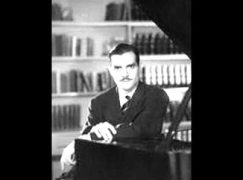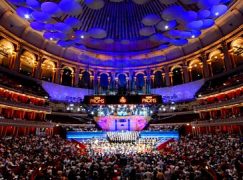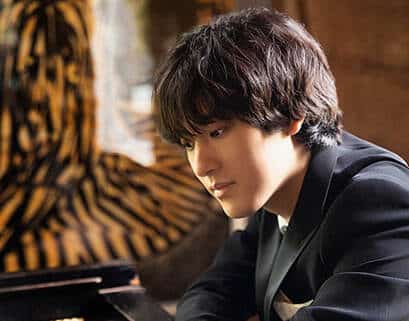Unheard Jorge Bolet
Daily Comfort ZoneMikhail Kaykov has found an unreleased Carnegie Hall track of a master pianist, sorely missed.

Mikhail Kaykov has found an unreleased Carnegie Hall track of a master pianist, sorely missed.
There is no room for Sir Simon Rattle…

The Vienna Philharmonic has just awarded honorary membership…

The summers season, rolled out today, shows welcome…

Ignore the annual furore about pop insertions at…

Session expired
Please log in again. The login page will open in a new tab. After logging in you can close it and return to this page.
Hard to believe he’s been gone 32 years now. Handsome guy. Gorgeous sound in so many of his recordings. Thank you for this.
This entire recital just started circulating on line. Fine, fine program:
Mendelssohn
Three Songs without Words, Op. 19b, Nos. 1 in E-flat, 3 in E, & 5 in F-sharp minor
Prelude & Fugue in E minor, Op. 35
Schumann
Carnaval, Op. 19
Weber-Godowsky
Invitation to the Dance
Liszt
Transcendental Etude No. 9 in A-flat “Ricordanza”
Il Penseroso (Years of Pilgrimage II – Italy)
Après une lecture du Dante – Fantasia quasi sonata
Encores
R. Strauss-Godowsky: Ständchen
Chopin: 2 Etudes, Op. 25, Nos. 1 in A-flat, & 2 in F minor
Chopin: Etude in A minor, Op. 25, No. 11 “Winter Wind”
April 19, 1980 at Carnegie Hall
A great pianist, who had a rather difficult life. He mentioned he once thought leaving classical music for good, because no contracts and no money. He wanted to start selling shoes to survive.
He was a friend of the Cuban President (before Castro) who loved his playing (Haydn Andante with variazioni) and promised him concerts that NEVER took place
Sadly, he was one of the first gay people that died of AIDS, when Reagan kept ignoring the pandemic….
Bolet was not “one of the first gay people that died of AIDS.” He died in 1990, at which point George H.W. Bush had been president for two years; ca. 100,000 US citizens had died of AIDS at that point. His death was a tragedy, but get your facts right.
Alas, it’s easy to tell why it wasn’t released: the stupid audience applauds before the return of the introduction! Idiots. Lovely performance and, for Godowsky, a remarkably restrained decoration of the original.
They’re not idiots. Godowsky writes in the score that the piece can end at that point – it would not be unreasonable for someone to applaud, even knowing that the original version continues to the quiet postlude. The urge to call audience members “idiots” is likely one reason that classical music is dying as an art form, thanks to snobs such as yourself.
Oh yeah, Fritz, you’ve got ALL the answers. I’m quite sure it’s not JUST the snobs that think your prognosis about classical music dying is complete and utter BS. When has it NOT been dying? We’ve heard this from your type for YEARS, and it’s always going to happen because the powers that be don’t adopt your ideas about dumbing the whole thing down and “inclusion”. Who cares if they applaud at that spot, and if someone gets peeved about it….he’s talking about why it couldn’t be issued….which is not important now, but I suppose at the time it was a concern.
I’ll bet all of us “snobs” are doing more to keep classical music in front of the public than your sort of armchair “expert”. Show me the evidence that “your” way is going to lead to the growth of a broad based growth of the base audience.
Sure, the people who shush those “idiots” who applaud at the “wrong time” in a piece that was last a common repertory item ca. 1900 are the ones who are “keeping classical music in front of the public.” Right, Jan. There’s a big difference between “dumbing down” the repertoire and acting like a rendition of a transcription of Weber’s Invitation to the Dance is a sacred rite.
For the record, RCA released Bolet’s 1974 live from Carnegie Hall album in which someone applauded before the last notes of the final Chopin prelude. To my knowledge, not a single reviewer commented on it, and it didn’t prevent anyone from buying the album. Bolet asked Decca (his label since 1978) to record and release his live performances, and they refused, not putting out a live recital of his until four years after his death. Any suggestion that the applause prevented a company from releasing this Weber (or any of his other recordings) is ahistorical and “idiotic.”
Well, I wasn’t there, but i wonder if Bolet did some body language that compelled the audience to think that the piece was over. This is a common problem in performing this piece – if you throw your right hand into the air with a flourish after that D-flat chord, expect applause!
Great stuff. As an aside, you must seek out and listen to M. Kaykov’s own playing- the man is nothing short of brilliant, a true diamond in the rough and a formidable master of the keyboard.
My piano teacher studied with him at Indiana. He said Bolet had to fight with the producers to keep wrong notes from live recitals on his records. He thought his wrong notes sounded better than other pianists’ right ones. He also couldn’t stand Richter, so mentioning his name was forbidden.
Richter and he were polar opposites in every way
Titanic pianist…… He liked our orchestra and returned many times for concerto appearances. I’ll never forget his Prokofieff
2nd…. Also recall one weekend when he played four concertos
over two nights. (1976)
There was a time — too long a time — when just about the only recorded example of his playing that was commercially available was an Everest LP of his Chopin, which I think they issued sometime in the 1960s. And as was its habit, Everest (which presumably had acquired a copy of the original tape from somewhere else) had badly botched, even worse than their norm, the fake “electronic stereo” that they felt was so important for their monaural records. They wanted that word “stereo” on every record jacket, hang the consequences. Even hitting the “mono” switch on your stereo receiver helped only slightly, because the essence of fake stereo was slightly out of phase reverb that was hard-baked into the sound.
I remember listening to that LP with my father who marveled that he had never heard of this Bolet and that it was great playing, but he could hardly stand to listen to it for very long.
That Chopin recital would have represented the young Bolet. It took years and years after that before Bolet started to make great sounding recordings, and by that time he had acquired something of a “grand old lion of the keyboard” reputation. Precious years were lost from a recording perspective.
The Invitation to the Dance, by the way, has been causing too-early applause for just about forever, whether in the Weber original, the Berlioz orchestration, or the Godowsky version. “Blame” Weber for writing a marvelous ending that isn’t the real ending, but he wanted to complete the charming little picture he had painted of the dancing couple. For the Berlioz version, Leonard Bernstein thought up one solution: an incredible diminuendo for that applause-enducing chord and then no gap before the “real” conclusion. I’ve also heard versions of the Berlioz version that just raise the white flat and end where the audience thinks it should. If I read “Fritz” correctly, above, Godowsky realized the realities as well.
Bolet provided the Liszt that Dirk Bogarde mimed to (really quite well!) in George Cukor’s early 60s biopic ‘Song Without End’. Trashy film* – but great introduction to Liszt for a teenager just beginning his exploration of music.
* PS But Capucine was dishy!…..
This “discovery” was posted (actually the whole recital was) on a private forum several days ago. It’s not the first time Kaykov has claimed he has discovered something and failed to give credit (not to mention seeking permission for distribution) to the actual source. He usually claims he got it from another individual but we all know he lurks on the forum and pretends that he “knows nothing”. Yeah right. As long as you continue to indulge him here on this blog I don’t imagine he’ll stop. Anyone who considers contributing to his channel should know about this cycle of thievery.
Here is the history of this April 23, 1980 Bolet Carnegie Hall recital recording, recently posted online and now circulating: At that point in his career, Mr. Bolet was without a commercial recording contract. His days as an exclusive RCA Victor artist ended when his contract there was abruptly terminated in 1975, as Thomas Z. Shephard became director of classics at RCA and replaced Bolet with pianist Tedd Joselson. Bolet’s association with British Decca didn’t begin until 1981. Given his chronic career bad luck, Bolet embraced every opportunity for recording that came his way: chamber music with the Juilliard Quartet for Columbia, stand-alone discs for L’Oiseau-Lyre including his justly famous Chopin-Godowsky Etudes and Waltzes, and in 1979 a three-LP deal with Vox Records that called for Liszt Concertos with David Zinman in Rochester, Tchaikovsky with Jerzy Semkow in St. Louis and this Carnegie Hall recital, which would have been a sequel to the now legendary 1974 Carnegie recital issued by RCA. (At the time, Horowitz was the only pianist who had two full Carnegie Hall recitals published on commercial recordings.)
The Liszt concertos were made in Rochester, but when Bolet arrived in St Louis for the Semkow recording, he was informed that Vox’s financing had fallen through. For the second time in Bolet’s rocky career, Gregor Benko, a co-founder of the International Piano Archives, stepped in to assist by enlisting friends of the pianist (including Ward Marston and me), to join in underwriting the cost of having the recital recorded “on spec”. This was with Bolet’s permission. That tape has been in the IPAM collection ever since. Those of us involved in the Marston Bolet series considered including this performance of the Godowsky Invitation, but found two other performances we liked better. We did include one of the 1980 Carnegie Hall encores, the Strauss/ Godowsky Ständchen, but wound up having to use an audience recording for, unaccountably, the encores were missing from the professional master tape made at our behest.
When a colleague asked Benko, Marston and me if we would object to his sharing the recital on a classical file-sharing site, we all said sure, go ahead, fully expecting what has come to pass. Maybe “found” is a bit of an exaggeration.
Francis Crociata
Date misstated: it was April 18, 1980.
I had the great honor and privilege to be Bolet’s student and teaching assistant at the Curtis Institute for seven years, before I left for my conducting career in Germany. What I heard him play at lessons was as great as any of the greatest pianists I heard live or on record, and often surpassed his concert performances. He hated recording and few of the later Decca recordings captured him at his very greatest. He was a consummate musician, he studied conducting with Reiner, knew the entire piano literature by memory and was playing late Schubert sonatas in the early 1940’s in Carnegie when very few others were. He auditioned for Furtwaengler and Koussevitsky, (with the Haydn variations, not some show piece) and was engaged by both for Beethoven #4 and both died before he performed with them! Careers are also made by luck, not just huge talent. And he did not have much, at least until he was close to 60. Much like his friend Simon Barere, and others.
Played a Balwin piano a real gentlemen worked many of his concerts over the years stagehand at carnegie hall